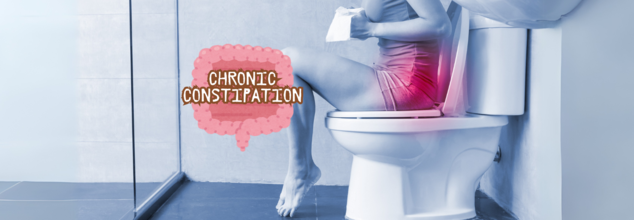
Image Credits: Health and me
6 Modern Lifestyle Habits That Are Keeping You Constipated- Here's How To Fix It
Chronic constipation can be more than a passing annoyance—it can disrupt daily life, impacting mood, energy, and overall health. Occasional constipation is not uncommon, but chronic constipation is a recurring problem that could be a sign of an underlying medical condition. Some are relatively harmless and simple to treat, but others will need medical attention.
Chronic constipation is more than an occasional annoyance—it can have a profound effect on daily functioning and overall well-being. Knowing what causes it, making the needed lifestyle changes, and getting the right treatment can bring substantial relief.
What Is Chronic Constipation?
Chronic constipation is defined by less than three weekly bowel movements that are hard to pass or that take a long time, lasting more than several weeks. Symptoms of this condition include less than three weekly bowel movements, straining during bowel movements, hard stools, bloating, and the feeling of incomplete evacuation. Epidemiological studies have shown that as many as 63 million North Americans have diagnostic criteria for chronic constipation, with prevalence rising with advancing age and being higher in women than men.
Dr. Kishan, Consultant Proctologist & Gastro Surgeon, points out the pervasiveness of constipation: "Constipation affects 16 out of every 100 adults and despite its prevalence, many people overlook it, assuming it to be a minor inconvenience rather than recognizing it as a legitimate health concern."
If left untreated, chronic constipation can significantly affect an individual's quality of life and even result in complications like hemorrhoids, anal fissures, and fecal impaction.
Causes of Chronic Constipation
Causes of chronic constipation are very diverse and can be classified into structural, medical, medication-induced, and functional causes. Chronic constipation may at times be a manifestation of underlying medical conditions, which include:
- Conditions such as colon cancer, strictures, or narrowing of the intestine may prevent normal stool passage.
- Parkinson's disease, multiple sclerosis, and spinal cord injuries may disrupt normal bowel function.
- Diabetes and hypothyroidism may slow down digestion and cause constipation.
- Hormonal changes and compression of the intestines may cause constipation.
Some medications may cause chronic constipation, including:
- Opioid pain medications (narcotics)
- Calcium channel blockers (for high blood pressure)
- Anti-seizure drugs
- Antidepressants
- Iron supplements
- Antispasmodics
When in such cases drug is the only cause, switching to another under medical guidance could relieve symptoms.
Constipation Without Any Underlying Condition
Functional constipation happens when there is no underlying medical or structural cause. Three are the leading types:
- Normal rate of passing stool through colon but hard in consistency and therefore difficult to pass.
- The colon absorbs too much water, resulting in hard, dry stools and slow bowel movements.
- A condition where pelvic floor muscles do not coordinate properly during bowel movements, leading to difficulty in passing stool.
Modern Lifestyle Habits Contributing to Chronic Constipation
Urban lifestyles of today contribute significantly to the rising incidence of chronic constipation. Lack of physical activity, irregular meal times, and stressful environments interfere with the natural functioning of the body. As per Dr Kishan, "Chronic constipation has a major effect on digestive health, is most commonly a direct consequence of modern lifestyle behaviors that interfere with the body's natural rhythm. The problems of chronic constipation reach far beyond mere physical discomfort, influencing overall well-being and quality of life."
There are a number of factors associated with modern-day lifestyles that add to the prevalence of chronic constipation, which are as follows:
Sedentary lifestyle: Physical inactivity makes it more difficult for the digestive system to work optimally.
Inadequate dietary fiber intake: Diets devoid of fruits, vegetables, and whole grains tend to provide low dietary fiber intake, which is necessary for good digestion.
Poor hydration: Most people do not drink enough water, and this makes the stools harder and more difficult to pass.
Processed and fast foods: Greater dependence on nutrient-deficient, high-fat, and low-fiber foods worsens digestive issues.
Stress and irregular routines: Elevated levels of stress and irregular eating times disrupt the body's inherent digestive rhythms.
Overuse of laxatives: Regular or long-term laxative use causes dependency, compromising the body to naturally control bowel movements.
Managing and Treating Chronic Constipation
A holistic treatment plan involves dietary changes, lifestyle adjustments, and, in certain situations, medical treatments.
1. Dietary Changes
Diet is one of the best methods for controlling chronic constipation.
Boost fiber – Eat more fruits, vegetables, nuts, seeds, and whole grains.
Hydrate – Drinking 8-10 glasses of water per day softens stools and facilitates bowel movements.
Add probiotics – Yogurt, kefir, and fermented foods support a healthy gut microbiome.
2. Physical Activity
Physical exercise is essential to digestive well-being.
Walking – A 20-30 minute daily walk keeps intestinal motility going.
Yoga and stretching – Specific yoga exercises assist in the relief of constipation.
Core strengthening exercises – Use abdominal muscles to help with digestion.
3. Stress Management
Severe levels of stress affect digestion. Ways to control stress include:
Meditation and deep breathing exercises
Adequate sleep – No rest causes interruption in digestion.
Mindful eating – Eating calmly enhances digestion.
4. Advanced Medical Treatments
For those that don't succeed with lifestyle adjustments, medical treatments can be the solution.
Colon Hydrotherapy – A non-surgical process that facilitates colon cleansing.
Biofeedback Therapy – Employed to retrain pelvic floor muscles in defecatory disorders.
Prescription Medications – Medicines like fiber supplements, stool softeners, and prokinetic agents can help bring relief.
Surgical Interventions – In a few instances when other treatment doesn't work, surgery can be suggested to correct structural problems.
It is crucial to visit the doctor if constipation is long-standing, along with bleeding from the rectum, sharp pain, unexplained weight loss, or if the symptoms are getting worse despite changing lifestyle.
Dr Kishan is a Consultant Proctologist & Gastro Surgeon at Healing Hands Clinic, Bengaluru in India
© 2024 Bennett, Coleman & Company Limited

